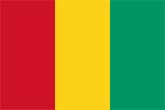Between the devil and the deep blue sea

The international community’s hasty decision to investigate Guinea’s Captain Camara for crimes against humanity has led to serious setbacks in solving the country’s political crisis, Joseph Kaifala argues in Pambazuka News. Since the only way for Camara to avoid trial at the International Criminal Court is to remain in power, it’s unlikely he’ll be willing to relinquish his military dictatorship any time soon, says Kaifala.
The problem with the international community is that it is either acting too slowly, with unnecessary consultations taking the bulk of its time, or acting too swiftly without proper thinking. The latter has been the problem with international response to the situation in Guinea. While the crisis warranted severe international condemnation, the hasty move to openly commence investigation for crimes against humanity, which means possible indictment for Captain Dadis Camara, has led to serious setbacks in finding solutions to the current political crisis. One would think that the international community is aware of this scenario by now.
Captain Camara knows, from the experiences of Charles Taylor on the one hand and Omar al-Bashir on the other, that the only way one can possibly escape the arms of the International Criminal Court (ICC) is to remain in power, especially when such power is sanctioned by the military. Proper thoughts on the part of the international community would have revealed that one does not invite a handshake with a fist. The international community’s call for Camara to be tried for war crimes, even before completing the investigation of the atrocities committed on 28 September this year, seems to me like a sentimental approach to a complex political problem. Their actions risk putting Guinea on track for many more years of military dictatorship.
The hasty actions were spearheaded by former colonial master France, especially by foreign minister Bernard Kouchner. This makes me wonder, as Camara might be thinking, whether the entire condemnation from France is just a 21st century revenge for Guinea’s 20th century rejection of La Republique when everyone else was falling for it. The massacre in Guinea obviously warrants judicial action, but the international priority should have been luring Camara out of power and reconstituting a democratic process in Guinea, as they did so well in the case of Charles Taylor and Liberia. But whether it was due to French interest in prosecuting their former recalcitrant child or the recklessness of international thinking, the consequences of their haphazard solutions will be far-reaching for Guineans. One thing is for sure, Camara is not going to offer himself as a sacrificial lamb out of fear from international sanctions.
Here is my revelation to those trying to find solutions to the crisis in Guinea. Camara is in the typical dilemma of standing between the devil and the deep blue sea. He could surrender and join his comrades in The Hague, or stay in power and risk becoming a pariah state. Of course the latter really just affects innocent civilians, such as those in Darfur or Harare. There will still be some clandestine international commercial desperados out there wishing to supply weapons and food in exchange for some of Guinea’s precious resources. Therefore, my suggestion to anyone with the goodwill to want to help ordinary Guineans, is to forget the easy and futile talk of sanctions, and focus on attractive solutions that can get Camara to hand over power.
The international community should put a halt to possible indictment for crimes against humanity until they find a solution to the future governance structure of Guinea; otherwise they might as well give up altogether. No amount of outside sanctions is going to threaten Camara, certainly not one from Ecowas or the African Union. A commission consisting of opposition leaders and members of the junta should be established to come up with recommendations for the way forward, and please, while you’re at it, no more power sharing deals.
BROUGHT TO YOU BY PAMBAZUKA NEWS
* Joseph Kaifala is from Sierra Leone. He is director of The Jeneba Project, a not-for-profit organisation providing educational assistance to Sierra Leone
* Please send comments to editor@pambazuka.org or comment online at Pambazuka News.

